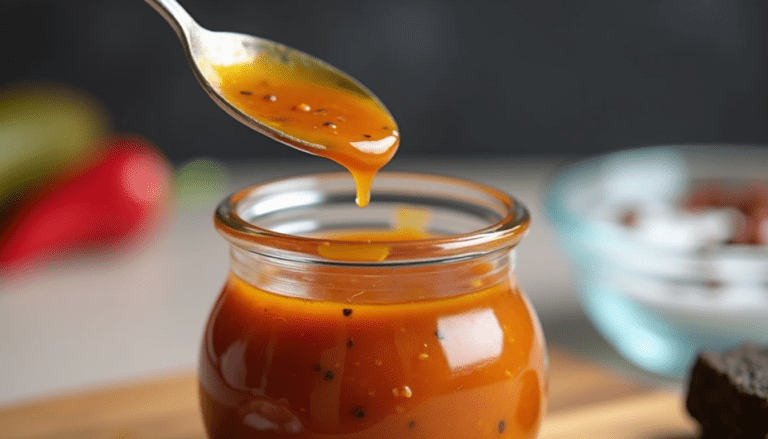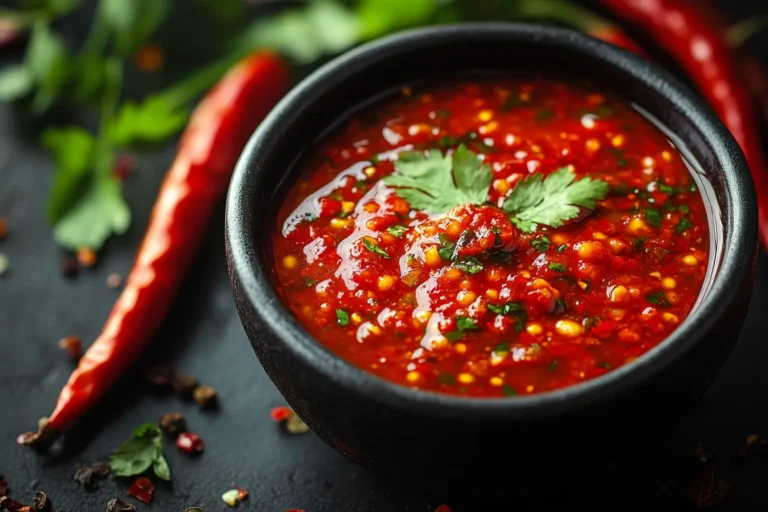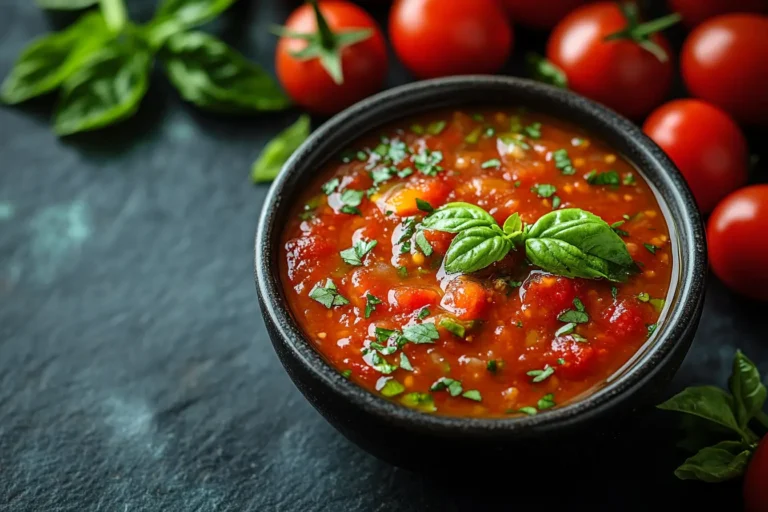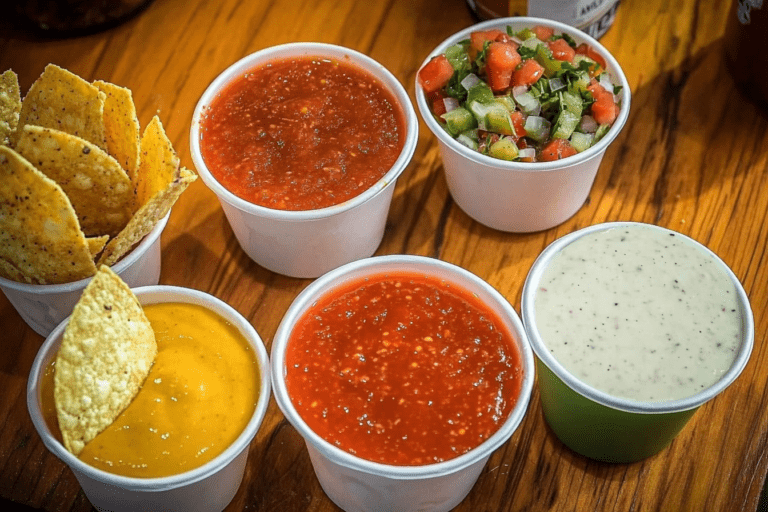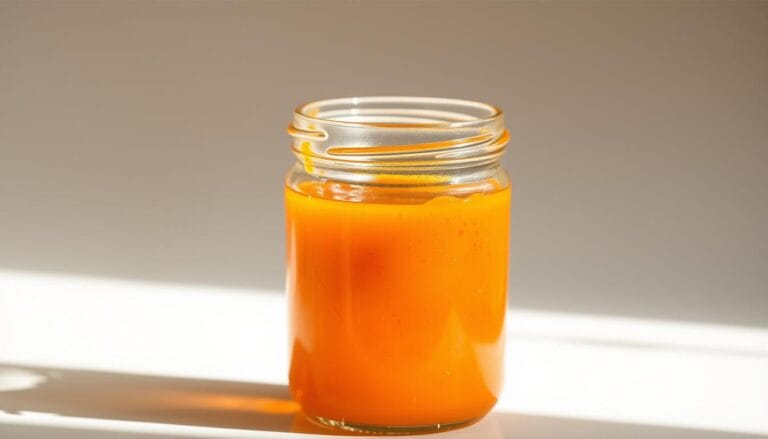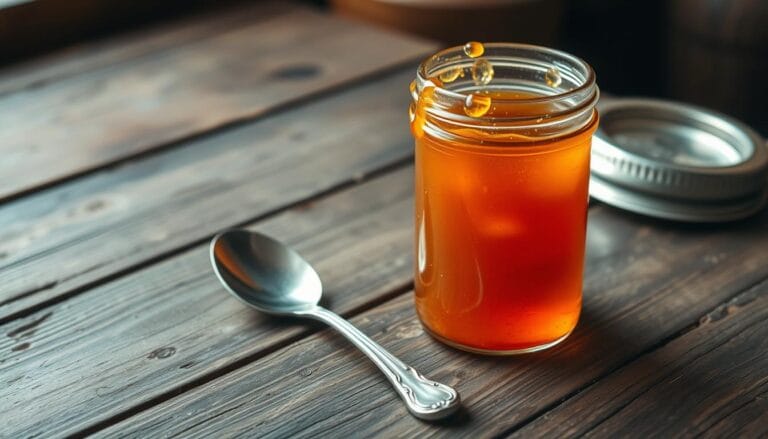How to Make a Traditional Mexican Hot Sauce Recipe
Growing up, I saw how a great mexican hot sauce recipe brings people together. It’s more than a condiment; it’s a bridge to tradition. When you mix fresh chiles and spices, you’re not just making sauce. You’re connecting to Mexico’s rich culinary past.
Making your own hot mexican sauce is about more than just heat. It’s about creating a memorable experience. Whether you love spicy foods or are just starting out, this guide will help you. From classic salsa roja to new ideas, you’ll learn the art of making Mexican sauces.
Key Takeaways
- Learn authentic techniques for creating Mexican hot sauce
- Understand the cultural significance of homemade sauces
- Master flavor balancing and heat control
- Explore versatile recipe adaptations
- Save money by making your own sauce at home
Understanding Mexican Hot Sauce: A Brief Overview
Mexican hot sauce is a vibrant part of their culinary tradition. It goes back thousands of years. Hot sauce in Mexico is more than a condiment. It’s a way to express flavor and heritage.
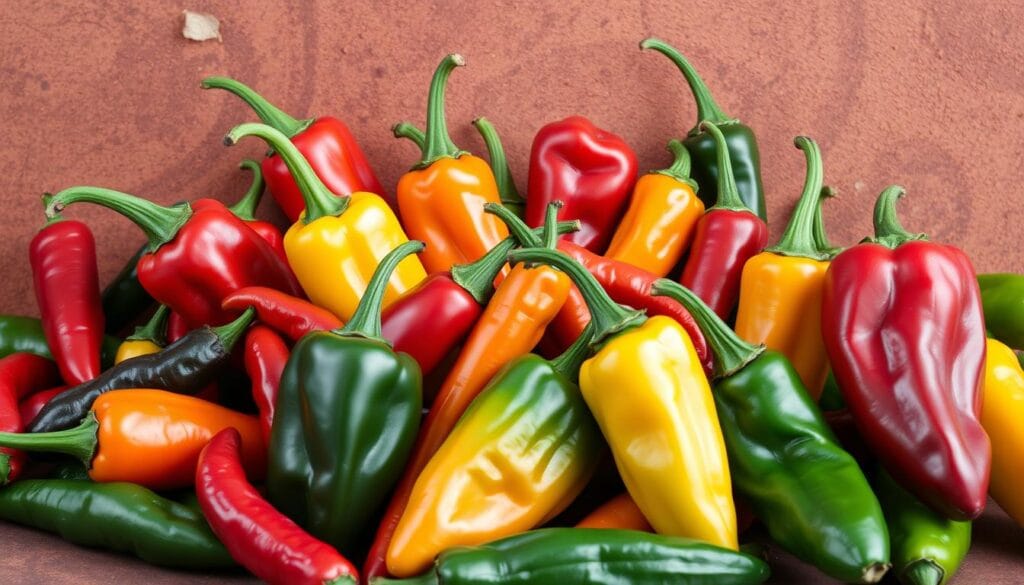
The History of Hot Sauce in Mexican Cuisine
The history of hot sauce starts with the Aztecs and Mayans. Chili peppers were not just food. They were a symbol of culture. People developed ways to make and keep peppers, laying the groundwork for today’s hot sauces.
- Chili peppers were central to ancient culinary practices
- Each region developed unique sauce variations
- Hot sauce reflected local agricultural traditions
Key Ingredients in Mexican Hot Sauce
Traditional Mexican hot sauces have special ingredients. Chiles de árbol and apple cider vinegar are key. Different peppers add their own flavors:
- Arbol peppers: Intense, bright red chiles
- Piquin peppers: Tiny but extremely spicy
- Habanero peppers: Known for eye-watering heat
“In Mexico, hot sauce is not just a condiment—it’s a way of life.” – Traditional Mexican Saying
Popular Variations Across Regions
Mexico’s varied landscapes have led to many hot sauce styles. The Yucatan has habanero sauces, while Veracruz has jalapeño blends. Each tells a unique story. Some brands have become famous worldwide, showing Mexico’s rich food heritage.
| Region | Signature Pepper | Flavor Profile |
|---|---|---|
| Yucatan | Habanero | Intense, fruity heat |
| Veracruz | Jalapeño | Medium heat, green pepper notes |
| Puebla | Poblano | Mild, slightly smoky |
Whether you love spicy food or enjoy exploring new tastes, Mexican hot sauce is a thrilling adventure. It’s a journey through flavors, traditions, and regional differences.
Essential Ingredients for Your Hot Sauce
Making the best Mexican hot sauce begins with picking the right ingredients. Your mexican hot sauce recipe will come to life with fresh and flavorful components. These elements bring authentic taste and heat to your kitchen.
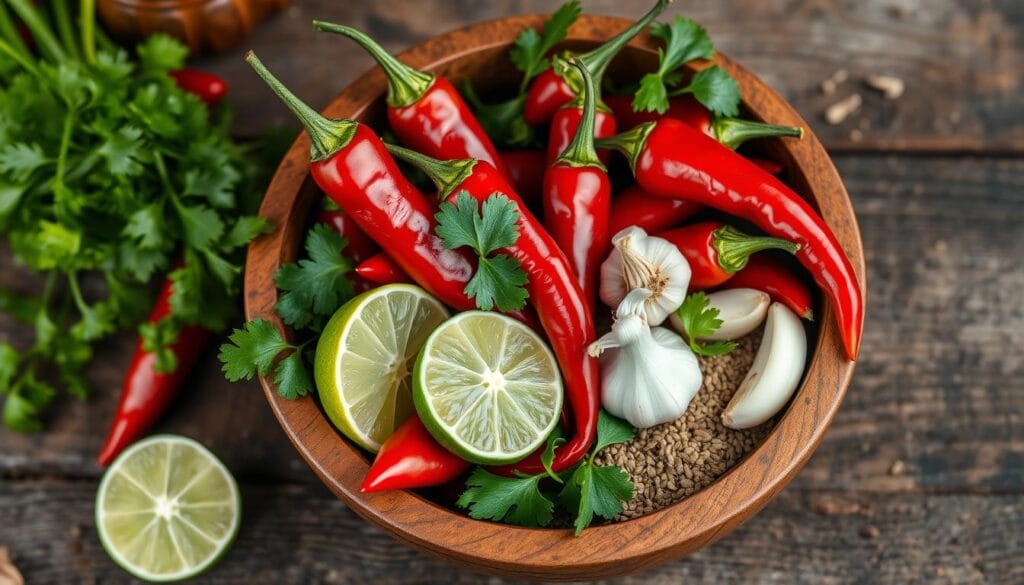
Fresh Chiles: Selecting the Perfect Peppers
Choosing the right chiles is key for a great hot sauce. Each pepper has its own heat level and flavor:
- Jalapeños: Mild heat (2,500-8,000 Scoville Heat Units)
- Serranos: Slightly hotter than jalapeños
- Habaneros: Intense heat (100,000-350,000 Scoville Heat Units)
Vinegar: The Flavor Balancer
Vinegar is vital in your hot sauce creation. It adds tanginess and helps preserve your sauce. This extends its shelf life by 6-12 months.
| Vinegar Type | Flavor Profile | Best Used With |
|---|---|---|
| White Vinegar | Sharp, clean taste | Jalapeño-based sauces |
| Apple Cider Vinegar | Sweet, fruity undertones | Fruit-infused hot sauces |
| Rice Vinegar | Mild, slightly sweet | Asian-inspired hot sauces |
Flavor Enhancers to Elevate Your Sauce
Consider these ingredients to make your hot sauce even better:
- Garlic: Adds depth and complexity
- Onions: Provides sweetness and body
- Cilantro: Brings fresh, herbal notes
- Lime juice: Introduces brightness
The secret to an exceptional hot sauce lies in balancing heat, acidity, and flavor.
Equipment Needed for Making Hot Sauce
Making a hot Mexican sauce recipe at home is exciting. You need the right tools to do it well. Having the right equipment makes cooking fun.
Blenders vs. Food Processors: Choosing Your Kitchen Companion
Choosing the right appliance is key when making hot sauce. Both blenders and food processors work well. But, each has its own benefits:
- High-powered blenders make smooth sauces
- Food processors are better for chunky textures
- Professional blenders are the best for hot sauce
Essential Utensils for Preparation
Some tools are crucial for making hot sauce:
- A sharp knife for cutting chiles
- A cutting board for pepper prep
- Measuring cups and spoons
- Protective gloves for handling hot peppers
Storage Containers for Your Sauce
Storing your hot sauce right keeps its flavor and freshness. Use:
| Container Type | Benefits | Recommended Usage |
|---|---|---|
| Glass bottles with tight seals | Keeps flavor, prevents contamination | Long-term storage |
| Sterilized mason jars | Airtight, stops bacterial growth | Fermented hot sauces |
| Plastic squeeze bottles | Easy to use, light | Everyday use |
Pro tip: Always refrigerate your homemade hot sauce. It lasts 3-6 months this way.
Preparing Your Hot Sauce Ingredients
Making a real mexican hot sauce recipe needs careful steps and focus. It’s important to know how to handle ingredients safely. This is key to making the best hot sauce in mexico.
Washing and Preparing Fresh Chiles
Start by washing your chiles well under cool water. Wear gloves to avoid irritation. Then, remove stems and slice chiles lengthwise to get rid of seeds and membranes.
- Rinse chiles carefully
- Wear protective gloves
- Remove seeds for milder sauce
- Pat chiles dry with paper towels
Chopping and Measuring Ingredients
Getting the right amounts is crucial for flavor balance in your mexican hot sauce recipe. Use a sharp knife to chop chiles and other ingredients finely. A kitchen scale helps with accurate measurements.
| Ingredient | Measurement | Purpose |
|---|---|---|
| Fresh Chiles | 4-6 ounces | Primary heat source |
| White Vinegar | 1/2 cup | Preservation and tang |
| Garlic | 2-3 cloves | Flavor enhancement |
Safety Precautions While Handling Chiles
Hot peppers have capsaicin, which can irritate skin and eyes. Always follow safety steps when making your hot sauce in mexico:
- Wear protective gloves
- Avoid touching your face
- Work in a well-ventilated area
- Wash hands thoroughly after handling
“Respect the pepper, protect yourself” – A common saying among hot sauce enthusiasts
Pro tip: If you accidentally touch your eyes after handling chiles, flush immediately with cool water and seek medical attention if burning persists.
The Basic Recipe: Steps to Follow
Making the best Mexican hot sauce recipe needs care and love. Whether you love cooking or just enjoy spicy food, making your own hot sauce is fun. It turns simple meals into special ones.
Now, let’s get into the key steps for a real hot sauce that will make your dishes better:
Step-by-Step Sauce Preparation
- Pick fresh chiles (like jalapeños, serranos, or habaneros)
- Wash and get your peppers ready
- Get other stuff like:
- Apple cider vinegar (1/4 cup)
- Garlic cloves
- Salt
- Roast peppers and veggies for more flavor
- Blend everything until it’s smooth
Adjusting Heat Levels Like a Pro
Homemade hot sauce is all about being flexible. You can change the heat by:
- Removing pepper seeds to make it less spicy
- Choosing milder peppers
- Adding more vinegar to cool it down
Achieving the Perfect Sauce Consistency
For the best hot sauce, follow these tips for consistency:
- Blend with short pulses
- Strain for a smoother sauce if you want
- Simmer to make it thicker
“The secret to an amazing hot sauce is balancing heat, acidity, and flavor.” – Mexican Culinary Experts
Pro tip: Chill your sauce in the fridge for 24 hours. This lets the flavors mix well. Your homemade hot sauce will last about 2 weeks in a sealed jar.
Flavor Variations: Customize Your Recipe
Creating a unique mexican hot sauce recipe lets you explore endless flavors. Every home cook can turn a basic hot sauce into a masterpiece. This is done by trying different ingredients and techniques.
Enhancing Your Sauce with Herbs and Spices
Spices can greatly change your mexican hot sauce brands’ taste. Here are some exciting options:
- Fresh cilantro for a bright, herbal note
- Cumin for an earthy undertone
- Dried oregano for traditional Mexican complexity
- Smoked paprika for depth
Sweetening Your Hot Sauce: Honey vs. Sugar
Adding sweetness to balance the heat makes the flavor more complex. Here’s a quick comparison:
| Sweetener | Flavor Profile | Best Used With |
|---|---|---|
| Honey | Floral, rich undertones | Fruit-based hot sauces |
| Sugar | Clean, straightforward sweetness | Traditional chile-based sauces |
Fruit Experiments: Adding Unique Flavors
Fruits can make your hot sauce truly special. Here are some popular choices:
- Mango for tropical sweetness
- Pineapple for tangy brightness
- Peaches for subtle summer flavor
- Passion fruit for exotic complexity
“The magic of hot sauce lies in personal creativity and fearless experimentation!” – Mexican Culinary Expert
When making your mexican hot sauce recipe, start with small batches. Gradually adjust ingredients to find your perfect flavor.
Fermentation: For a Deeper Flavor
Explore the world of fermented hot sauce, a method deeply rooted in Mexico’s traditions. It turns simple ingredients into amazing condiments. This process makes the best Mexican hot sauce recipes even more flavorful.
Understanding the Fermentation Magic
Fermentation does more than preserve food. It also adds depth and character to your hot sauce. During this process, good bacteria break down peppers. They create complex flavors that store-bought sauces can’t match.
Simple Home Fermentation Steps
- Select fresh, high-quality chili peppers
- Chop peppers and mix with salt
- Place in a clean, sterilized jar
- Cover with a breathable cloth
- Let sit at room temperature for 3-7 days
- Stir and taste daily
Table of Contents
Benefits of Fermented Hot Sauce
Fermented hot sauces have many benefits:
- Probiotic boost for gut health
- Enhanced flavor complexity
- Natural preservation
- Increased nutritional value
“Fermentation transforms simple ingredients into a culinary masterpiece.” – Traditional Mexican Cooking Wisdom
Pro tip: Keep your sauce in the fridge to slow down fermentation. This helps keep its unique flavor. A well-fermented hot sauce can last up to a year if stored right.
Using Your Hot Sauce: Culinary Applications
Your homemade mexican hot sauce recipe is more than just a condiment. It’s a versatile tool that can make ordinary meals special. Learning how to use it well will boost your cooking skills and delight your taste buds.
Pairing Hot Sauce with Dishes
The right hot sauce can make many dishes taste better. Here are some great pairings:
- Grilled meats and seafood
- Breakfast eggs and omelets
- Tacos and enchiladas
- Roasted vegetables
- Pizza and sandwiches
Hot Sauce in Marinades and Dressings
Turn your mexican hot sauce recipe into a powerful marinade. The capsaicin in chili peppers tenderizes meats and adds flavor. Mix it with olive oil, lime juice, and herbs for a zesty marinade for chicken, beef, or fish.
| Ingredient | Quantity | Purpose |
|---|---|---|
| Hot Sauce | 2 tablespoons | Flavor base |
| Olive Oil | 1/4 cup | Tenderizing agent |
| Lime Juice | 2 tablespoons | Acidity balance |
Creative Uses Beyond Traditional Dishes
Be bold with your hot mexican sauce recipe! Try these unique uses:
- Drizzle over popcorn
- Mix into cocktail bloody marys
- Use as a pizza sauce alternative
- Create spicy salad dressings
“Creativity in the kitchen knows no boundaries when you have a great hot sauce.” – Chef Marco Rodriguez
With just 6 ingredients and little prep time, your homemade hot sauce can become a kitchen essential. It turns everyday meals into exciting culinary adventures.
Storage Tips for Your Hot Sauce
Making homemade Mexican hot sauce is an art. Knowing how to store it properly is key for keeping its flavor and ensuring food safety. Whether you’re making a recipe inspired by traditional hot sauce in Mexico or creating your own, understanding storage is crucial.
Refrigeration Best Practices
Proper refrigeration extends your homemade hot sauce’s life. Here are some important storage tips:
- Use clean, sterilized glass containers with tight-fitting lids
- Store at consistent temperatures below 40°F
- Keep the container sealed when not in use
- Place in the main refrigerator compartment, not door shelves
Understanding Shelf Life
Homemade hot sauces last longer than commercial ones. Here’s a detailed guide:
| Storage Method | Expected Shelf Life | Preservation Conditions |
|---|---|---|
| Refrigerated | 4-6 months | Tightly sealed, consistent temperature |
| Room Temperature | 1-2 weeks | Low humidity, away from direct sunlight |
Freezing for Long-Term Storage
Freezing is a great way to keep your homemade hot sauce. Pro tip: Leave space in the container for expansion. Use freezer-safe glass or plastic containers.
“The key to great hot sauce is not just in making it, but in preserving its original flavor and heat.” – Mexican Culinary Expert
Always check for spoilage signs like unusual color, off-odors, or mold. If unsure, it’s best to throw it away. By following these tips, your homemade hot sauce will stay delicious and safe for months.
Hot Sauce Labels: Personalize Your Creation
Making the perfect label for your best mexican hot sauce recipe is more than just decoration. It’s about telling a story. Your homemade hot sauce needs a unique identity that shows its flavor and your style.
Creating Custom Labels with Personality
Designing a catchy label can turn your mexican hot sauce recipe into a memorable brand. Think about these important things:
- Choose vibrant colors that show your sauce’s personality
- Select bold typography that stands out
- Include key ingredient information
- Highlight heat level visually
Naming Your Hot Sauce: Creative Inspiration
Naming your sauce is an art form. Get inspiration from:
- Family heritage
- Unique ingredient combinations
- Personal experiences
- Local cultural references
Packaging and Presentation Tips
Make your hot sauce a memorable gift with professional packaging:
| Packaging Element | Recommended Approach |
|---|---|
| Label Material | Waterproof, high-durability vinyl |
| Color Scheme | High-contrast colors for visibility |
| Additional Features | QR code linking to recipe or story |
“A great label tells a story before the first drop touches your tongue.” – Hot Sauce Artisan
Remember, your label is the first impression. Make it count by combining creativity, clarity, and personal passion. Your best mexican hot sauce deserves nothing less!
Troubleshooting Common Issues
Making the perfect hot mexican sauce recipe can be tricky. Whether you’re new or experienced, knowing how to fix common problems is key. This way, you can make an amazing mexican hot sauce recipe every time.
When Your Sauce Is Too Spicy
Did you make a sauce that’s too hot? No worries! There are ways to make it less spicy:
- Add dairy products like yogurt or sour cream
- Mix in some sugar or honey
- Incorporate more tomatoes or roasted vegetables
- Dilute with additional vinegar or water
Balancing Flavors: Adjusting Acidity and Heat
Getting the flavors right is key in a great hot sauce. Here are some tips:
| Flavor Issue | Solution |
|---|---|
| Too Acidic | Add a pinch of sugar or roasted vegetables |
| Lacks Complexity | Incorporate fresh herbs or spices |
| Flat Taste | Increase salt in small increments |
Dealing with Thick Sauce Consistency
If your sauce is too thick, it’s easy to fix. Pro tip: Add water or vinegar gradually, mixing until it’s right. Use 20-30% vinegar by weight for good preservation.
“The art of making hot sauce is all about balance and experimentation!” – Mexican Culinary Expert
Remember, making the perfect hot sauce takes time. Don’t get discouraged if it’s not perfect at first. Every try gets you closer to your own unique mexican hot sauce recipe!
Sharing and Enjoying Your Hot Sauce
Making hot sauce in Mexico is more than cooking. It’s a way to connect with Mexican culture. Brands like Cholula and Tapatio inspire many to try making their own. Your homemade sauce links you to a long tradition of delicious flavors.
Hosting a hot sauce tasting party is a great way to share your sauce. Invite friends to try your sauce and classic Mexican brands. Serve it with tacos, nachos, and sliders to show its many uses. Each taste is a chance to share your cooking story and the rich history of hot sauce in Mexico.
Giving homemade hot sauce as a gift is a thoughtful act. Create personalized labels that highlight your sauce’s unique taste. Put your sauce in small, pretty bottles with serving ideas. Your friends will love the personal touch and the chance to taste a homemade Mexican condiment.
Every drop of hot sauce has a story—your story. Embrace the creativity, passion, and cultural importance of this beloved condiment. Let your homemade hot sauce invite others to explore the rich world of Mexican cuisine.


